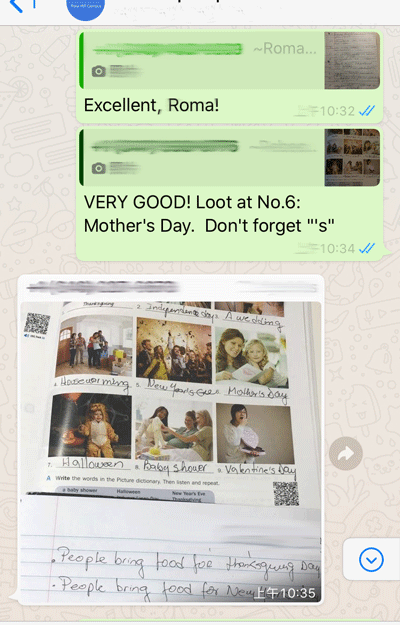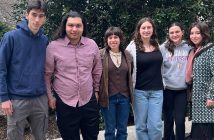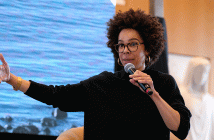Fordham has expanded its free English as a Second Language (ESL) and literacy courses to serve more adult immigrants in the Bronx, thanks to a grant from the Mother Cabrini Health Foundation. Due to the COVID-19 pandemic, the program has also embraced an unusual teaching platform—WhatsApp, a free mobile application.
Despite the many serious challenges New Yorkers faced during the early days of the pandemic, the pivot to mobile learning did not disrupt the commitment of English language learners or their teachers, said James Stabler-Havener, director of Fordham’s Institute of American Language and Culture (IALC).
“Students and teachers persisted with their classes and far exceeded the city’s benchmarks for educational gains. This is a testimony to the resilience and grit of our neighbors and the creativity of the Institute’s staff,” said Stabler-Havener.
For more than three decades, IALC has offered English courses to college students from around the world. In 2018, IALC extended its courses to the Bronx community for free. Since then, more than 450 people have participated in the program, which has also provided free career workshops and programs on immigrant rights.
Supporting Vulnerable New Yorkers
In 2019, Fordham was awarded a grant of $116,679 from the Mother Cabrini Health Foundation to support the ESL program, which taught more than 200 students in 2019-2020. The grant funded instruction for approximately 70 students, helped secure a new class location—the Immaculate Conception Church on East Gunhill Road—and created additional evening classes at the Rose Hill campus for students who work during the day.
“We are so grateful for the support of the Mother Cabrini Health Foundation,” said Stabler-Havener. “We’re proud to partner with them in their work to support immigrants and help them succeed.”
Classes started in person in late winter. But when the pandemic struck New York City in March, the Community ESL program—and its students, many of whom are essential workers—took a major hit.
More than 40% of students and staff contracted the new coronavirus, according to survey results from late June. Thirty-seven percent reported they had between one and 12 infected family members, while 6.4% said they had lost up to four family members due to complications from the virus. Meanwhile, they watched neighbors and church community members become hospitalized or die from the virus.
“My husband and I were left without a job, and we could not apply to economic benefits due to our immigration status,” Raysa, a 47-year-old woman from the Dominican Republic, wrote in an email. “My husband, my sister-in-law, and my cousin and I had COVID-19. Many of my friends died in New York and the Dominican Republic.”
Students with children studying remotely from home said they struggled to find space and time to concentrate on their own studies. But they were determined to complete their classes, said IALC staff members. In mid-March, the Community ESL program transitioned to delivering instruction via WhatsApp, a free messaging app available on any cell phone. For the students—many of whom lacked personal computers or the internet at home—it was the most convenient platform.
Every week, students met in three-hour classes on the app. They watched tutorial videos recorded by their teachers and completed digital worksheets. They checked their answers against online answer keys and asked peers and teachers for help via text message. But students and staff also used the app to ensure that they were all safe and healthy.
A Way to Check In
“When we first heard about students who got infected with Covid, we kept track of those students to provide resources—to say, hey, do you have food in your pantry? Can we register you for food services that the city is providing? Have you been tested? Have you gone to the hospital?” said Community ESL Program Coordinator Jesús Aceves-Loza. “It was not only the ESL instruction that we offered, but also keeping track of those students and their family members who were affected by Covid. That flourished out of the community we created on WhatsApp.”
Aceves-Loza recalled students who called or texted him to confirm they had COVID-19 and couldn’t make it to class, yet promised to complete the day’s exercises. Another student, whose husband was receiving therapy for a separate condition after being in the hospital for three months, also continued her studies, he said.
“Those are tiny examples of people who have developed resilience and a desire to be better and to overcome obstacles, and to live to the best of their abilities,” said Aceves-Loza. “When there’s a will, there’s a way.”
‘We Took Care of Each Other’
In emailed testimonials, students described how the ESL program impacted their lives.
Raysa said she can now pick up the phone at work, talk with clients, and speak with her doctor without translation. For student Ramiro Perez, a 29-year-old construction worker from Guatemala, the program helped him communicate better with his coworkers. And for Silva, a 27-year-old woman from Albania, the program helped her become more active outside her home.
“As a mother who takes care of her daughter and stays at home, [the program]has made me active and more social with people who are not in my community,” Silva wrote.
As the students learned English, Yimeng Li, one of three ESL teachers who taught during the pandemic, said she saw her students grow and stay optimistic.
“Even though most of my adult ESL students faced challenges due to the spread of the COVID-19 pandemic, they were still eager to continue their English language learning,” said Li, a 2019 alumna from the Graduate School of Education. “Even though I couldn’t meet and greet my students due to social distancing, our hearts were always together. And no matter how difficult the problems might be, all the students and instructors had positive attitudes … We took care of each other.”
At the end of April, Li and her students held their last class together. Li messaged them a thank-you note on WhatsApp, recorded with her own voice. In their final lesson, she asked them to write their own thank-you note in English to someone. A few students chose Li.
“I will always carry you in my heart. Hopefully one day we will meet again,” a student wrote to Li and her colleagues in a handwritten note. “God bless you, Jesus, Xiomara, and all those who make this program possible.”




